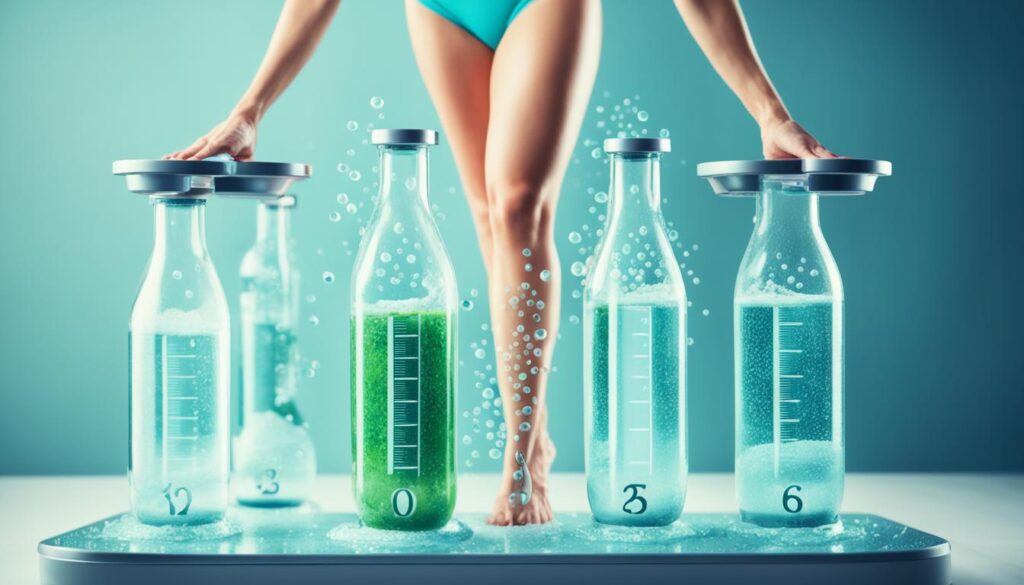The water diet, also known as water fasting, is becoming more popular as a quick way to lose weight and boost health. This method involves drinking only water for 24-72 hours. The goal is to help with weight loss, detox, and lower the risk of chronic diseases. But, it’s important to know that not all research supports it, and it might not work for everyone.
Recent studies have looked into how water fasting affects health. A 2021 study with 12 middle-aged men showed big changes in blood and urine after an 8-day fast. This suggests it could help with metabolic health. A 2022 study with 48 men and women found weight loss, lower BMI scores, and lower blood pressure after a 10-day fast. But, about half of the 2022 study’s participants quit due to side effects like headaches and fatigue.
Even though the water diet might have some benefits, like improving health markers and lowering disease risk, it’s important to be careful. Water fasting can cause dehydration, leading to dizziness and headaches. Also, the weight loss might be mostly water and muscle, making it hard to keep up over time.
Key Takeaways
- The water diet involves consuming only water for 24-72 hours to promote weight loss and detoxification.
- Limited studies suggest potential benefits such as reduced risk of chronic diseases and improved metabolic health.
- Water fasting can lead to dehydration and may not be suitable for everyone, especially those with certain health conditions.
- Weight loss during water fasting may be largely due to the loss of water and muscle mass, making it hard to sustain.
- It is essential to approach the water diet with caution and consult a healthcare professional before attempting it.
What is the Water Diet?
The water diet, also known as water fasting, means not eating and only drinking water for a while. It’s been around for thousands of years, used for spiritual, religious, and health reasons. Now, it’s also popular for losing weight and detoxing the body quickly.
Defining the Water Diet and Its Origins
Water fasting has deep roots in religious and spiritual practices. Many faiths, like Christianity, Islam, and Buddhism, include fasting in their traditions. These fasts often mean not eating or drinking, but sometimes you can drink water. It’s also used to treat health issues and improve overall health.
Today, the water diet is known thanks to wellness trends and famous people supporting it. A well-known example is the lemon detox cleanse. This involves drinking lemon juice, water, maple syrup, and cayenne pepper for up to 7 days. It’s based on the water diet and aims to help with weight loss and detox.
How the Water Diet Works
The water diet is simple: you only drink water for a certain time, usually 24 to 72 hours. This makes your body fast, which changes how it works. It starts to burn fat for energy, which can lead to weight loss. It also starts a process called autophagy, where the body gets rid of old, damaged cells and makes new, healthy ones.
There are no official rules for water fasting, so be careful with it. Before starting, you should eat less for a few days to help your body adjust. While fasting, drink lots of water to stay hydrated. When you stop fasting, don’t eat too much right away. This can cause bad symptoms or even a dangerous condition called refeeding syndrome. It’s better to start with a smoothie or a small, easy-to-digest meal.
| Fasting Duration | Potential Benefits | Risks and Considerations |
|---|---|---|
| 16/8 Intermittent Fasting | Weight loss, improved insulin sensitivity | Minimal risks for healthy individuals |
| 24-72 Hour Water Fast | Weight loss, autophagy, reduced inflammation | Dehydration, electrolyte imbalances, low blood sugar |
| Prolonged Water Fast (5-20 days) | Significant weight loss, improved insulin resistance, reduced blood pressure | Muscle loss, nutrient deficiencies, increased risk of complications |
The water diet might not be right for everyone. People with health issues like diabetes, gout, or eating disorders should talk to a doctor before trying it. Pregnant women, breastfeeding moms, kids, and older adults should also avoid it because of the risks.
Potential Benefits of the Water Diet
The water diet is becoming more popular for its health benefits. It may help with weight loss, improve hydration, and reduce the risk of chronic diseases. But, we need more studies to know how it works.
Weight Loss and Body Composition Changes
Many people try the water diet for quick weight loss. Studies show it can lead to losing a lot of weight and changing body composition. For example, middle-aged men lost an average of 13 pounds after an eight-day fast.
But, most of this weight loss is from water, glycogen, and muscle, not fat. Water fasting might also make the body better at using insulin and leptin. This could help prevent obesity and related health problems. A study found that fasting for three days cut insulin levels by 30%.

Improved Hydration and Detoxification
It might seem odd, but the water diet can cause dehydration if not done right. This is because a lot of our daily water comes from food. To stay hydrated, drinking more water is key. Experts suggest drinking 2-3 liters a day while fasting.
Proponents believe it helps detoxify the body and start autophagy. Autophagy is when the body breaks down and recycles old cells. This could be good for many organs like the heart and liver.
Reduced Risk of Chronic Diseases
Water fasting might lower the risk of diseases like diabetes, cancer, and heart disease. A study found it reduced triglyceride levels, which is good for the heart. Animal and human studies also suggest it can slow cancer cell growth and help with chemotherapy.
Other benefits include less inflammation, a stronger immune system, and lower leptin levels. In one study, 90% of people with high blood pressure got their blood pressure back to normal after fasting.
| Potential Benefit | Supporting Evidence |
|---|---|
| Weight Loss | Average weight loss of 13 pounds in middle-aged men after an 8-day water fast |
| Improved Insulin Sensitivity | 30% reduction in circulating insulin levels after fasting for 3+ days |
| Lower Heart Disease Risk | 24-hour water fast significantly reduced blood triglyceride levels |
| Blood Pressure Normalization | 90% of hypertensive individuals saw blood pressure normalize after water fasting |
These findings look promising, but we need more research. Long water fasts can be risky and should be done with a doctor’s advice.
Latest Research on the Water Diet and Its Health Benefits
Researchers are looking into the water diet’s health perks, like weight loss and better hydration. Studies now show how it affects our health.
Studies on Weight Loss and Body Composition
A 2022 study had 12 people, five women and seven men. They tried a three-day water fast. They lost an average of 5.7 kg, which was mostly fat and some muscle.
After eating normally for three days, most muscle mass came back. But the fat loss stayed.
The study looked at 3000 plasma proteins before, during, and after fasting. They found links between protein changes and health issues like arthritis and heart disease.
Research on Hydration and Detoxification Effects
The water diet might help with hydration and detox, but we need more studies. About 20% of our fluids come from food, the rest from drinks. Experts suggest drinking about 15.5 cups a day for men and 11.5 cups for women.
Drinking from fruits, veggies, and certain drinks also counts towards our daily water goal. We can check if we’re hydrated by looking for signs like not feeling thirsty and having clear urine.
Findings on Chronic Disease Prevention
Studies show water fasting might prevent chronic diseases. Fasting three days a week can lower diabetes risk by making insulin work better. It also cuts down inflammation.
Alternate-day fasting can lower cholesterol and heart disease risk in the overweight. Animal studies suggest it may even help us live longer by changing our gut bacteria and boosting sirtuins.
| Fasting Method | Potential Health Benefits |
|---|---|
| Intermittent Fasting | Reduced inflammation, improved insulin sensitivity, decreased risk of type 2 diabetes |
| Alternate-Day Fasting | Reduced total cholesterol and heart disease risk factors in overweight individuals |
| Water Fasting (3 days) | Significant weight loss, reduced fat mass, potential benefits for chronic disease prevention |
These results look good, but we should be careful with water fasting. It’s best to do it with a doctor’s help because of the risks. Shorter fasting periods might be safer and easier to follow for health benefits.
Risks and Considerations of the Water Diet
The water diet might seem appealing for weight loss and detox, but it comes with risks. It can cause dehydration, orthostatic hypotension, and electrolyte imbalances. These issues can be serious if not addressed.

Potential Side Effects and Complications
Dehydration is a big concern with water fasting. It happens when the body loses a lot of water. Signs of dehydration include:
- Thirst
- Dry mouth and lips
- Fatigue
- Dizziness
- Headaches
- Dark-colored urine
Orthostatic hypotension, or a sudden drop in blood pressure when standing, can happen. It may cause dizziness, lightheadedness, and even fainting. This increases the risk of falling and getting hurt.
Water fasting can also cause imbalances in electrolytes, like sodium and potassium. These imbalances can lead to muscle cramps, weakness, and irregular heartbeat. In severe cases, it can cause cardiac arrhythmias or seizures.
Other side effects of the water diet include:
- Fatigue and lack of energy
- Difficulty concentrating
- Headaches
- Digestive issues, such as nausea or constipation
- Increased risk of binge eating behaviors
Who Should Avoid the Water Diet
The water diet isn’t for everyone. It can make some health conditions worse. People with these health issues should avoid it:
| Medical Condition | Potential Risks |
|---|---|
| Gout | Increased uric acid production, triggering gout attacks |
| Eating Disorders | Encouragement of disordered eating behaviors |
| Pregnancy and Breastfeeding | Insufficient nutrient intake for fetal development and milk production |
| Children and Older Adults | Higher risk of dehydration and nutrient deficiencies |
| Diabetes | Difficulty managing blood sugar levels and increased risk of hypoglycemia |
| Heart Conditions | Strain on the cardiovascular system due to electrolyte imbalances |
People with chronic illnesses or on medications should talk to a doctor before trying a water fast. It could affect their treatment or make their condition worse.
“The water diet is a controversial and potentially dangerous approach to weight loss and detoxification. It is crucial to prioritize overall health and well-being by adopting a balanced, nutrient-rich diet and staying adequately hydrated.”
Implementing the Water Diet Safely
When thinking about the water diet, it’s key to focus on safety and get a doctor’s advice. Before starting, talk to your doctor to make sure it’s right for you. It’s also vital to stay hydrated and listen to your body during the fast. If you feel dizzy or faint, stop fasting right away.
A study in 2018 showed that an 11-day water fast can lower blood pressure and weight. But, it’s important to know that fasting can drop blood cholesterol and triglyceride levels fast. You might lose weight, but it’s mostly water, carbs, and muscle, not fat.
When ending your fast, start eating slowly to avoid refeeding syndrome. This serious condition happens when your body’s fluid and electrolyte levels change too quickly after fasting. A study in Nature Metabolism found big changes in the body after fasting, showing health perks beyond just losing weight.
Before trying the water diet, know the risks and side effects:
- Dehydration is a risk since 20-30% of our daily water comes from food.
- Fasting can make conditions like gout, diabetes, and eating disorders worse.
- Side effects include hunger, headaches, nausea, vomiting, and trouble sleeping.
Instead of water-only fasting, try intermittent or alternate-day fasting for safer weight loss. These methods limit when you eat or alternate fasting days. Intermittent fasting is a good choice, eating in an eight-hour window to cut calories naturally.
Fasting with a nutritionist’s help is best, especially if you have health issues.
By being careful and working with a health expert, you can safely try the water diet and see its benefits.
Fasting Duration and Weight Loss
| Fasting Duration | Weight Loss |
|---|---|
| 5-day water fast | 4% to 6% |
| 7 to 10-day water fast | 2% to 10% |
| 15 to 20-day water fast | 7% to 10% |
Conclusion
The water diet has caught people’s attention for its possible water diet benefits, like losing weight, staying hydrated, and lowering the risk of chronic diseases. But, it’s key to look at the risks and precautions of this extreme fasting method. Some studies hint that water fasting might help with autophagy and better health markers, but the evidence is still thin. This diet can cause dehydration, electrolyte imbalances, and a drop in blood pressure when standing up. Losing just 1-3% of your body weight can make you feel tired and affect your brain.
Not everyone can do the water diet safely, especially those with health issues like gout, diabetes, or eating disorders. Pregnant women, older folks, and kids should also stay away from it without a doctor’s watchful eye. For those wanting to try fasting, alternative fasting methods like intermittent fasting might be safer and easier to stick with. Always talk to a healthcare pro before starting any new diet or lifestyle change to make sure it’s right for you.
In the end, the water diet might have some benefits, but the risks and the limited research mean it should be taken with care. By focusing on safety, listening to your body, and getting advice from a healthcare pro, you can make smart choices for your health. For more info on the water diet and its health benefits, and other fasting options, check out trusted sources and talk to medical experts for the best advice.




